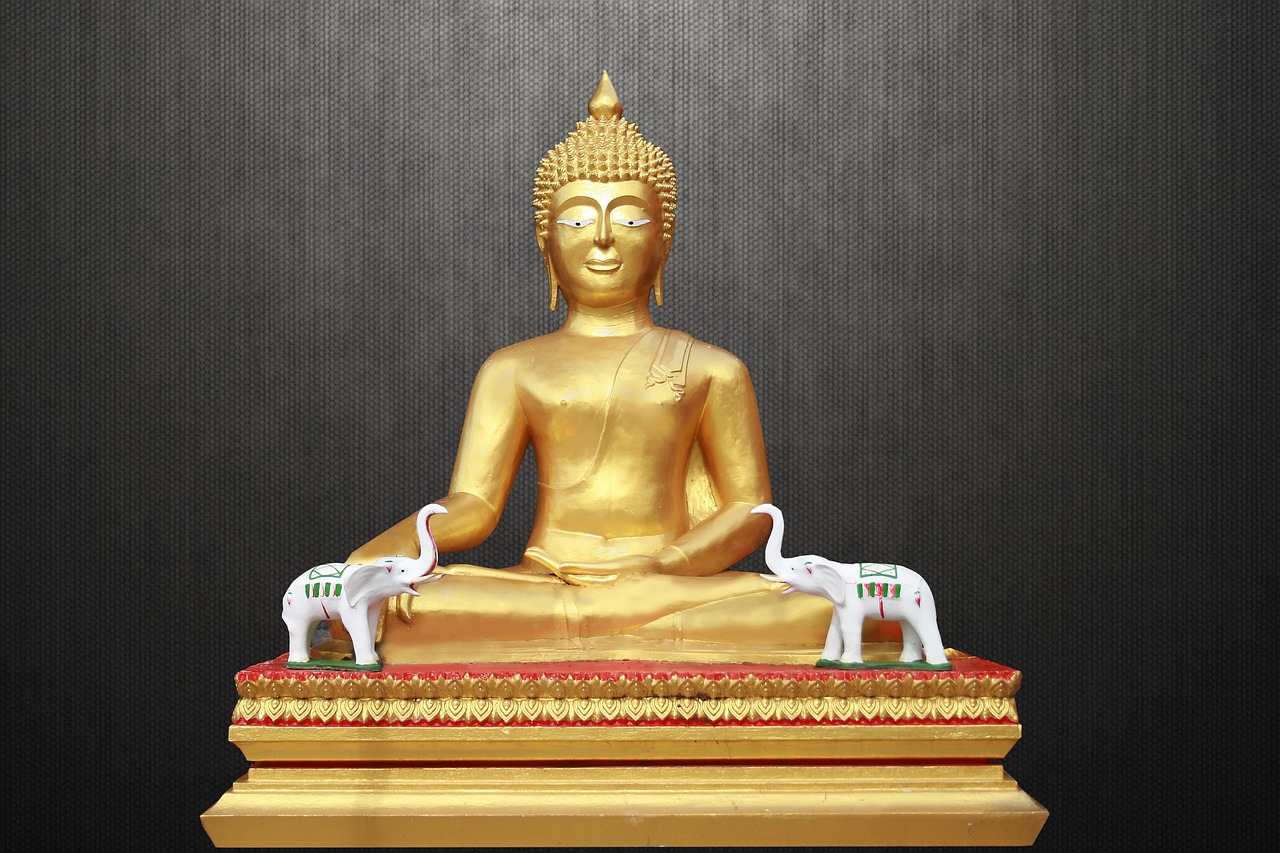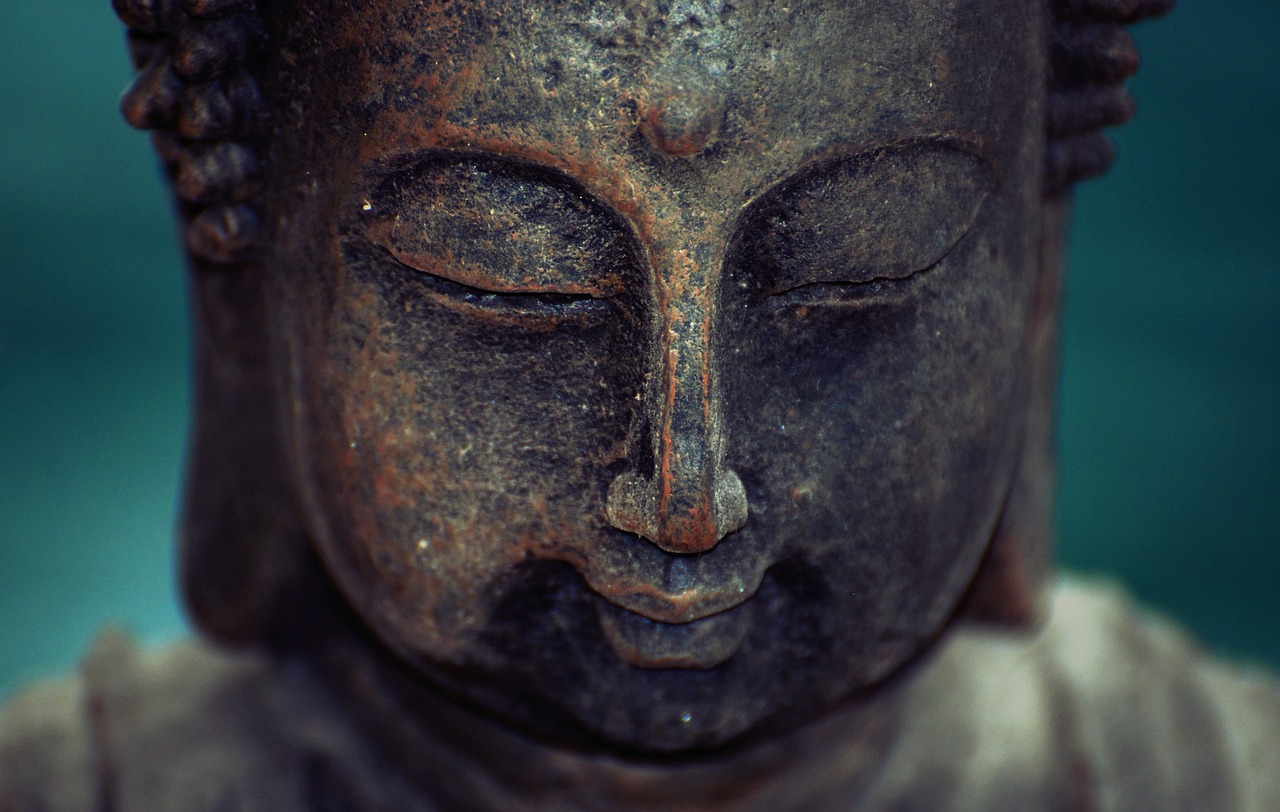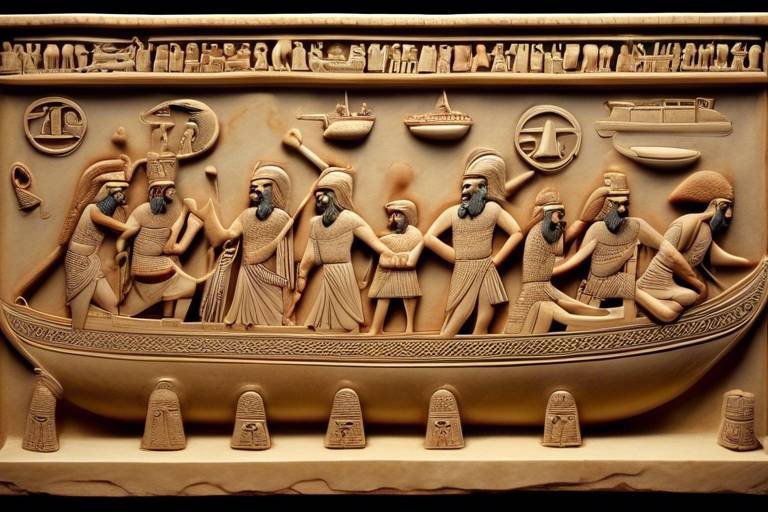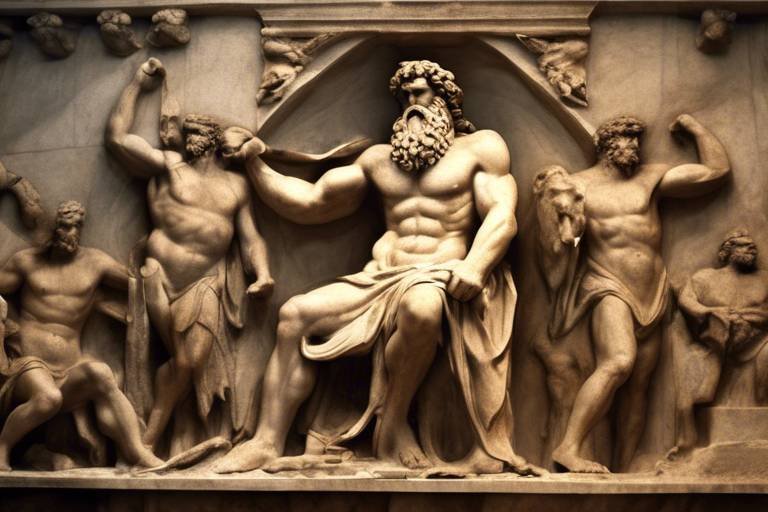The Secrets of the Ancient Eastern Philosophies
Embark on a journey through time and wisdom as we uncover the profound secrets of ancient Eastern philosophies. These age-old teachings, including Taoism, Confucianism, and Buddhism, have left an indelible mark on cultures and individuals for centuries, offering a unique perspective on life, spirituality, and the universe.
Firstly, let's delve into Taoism, a philosophy that centers around harmony, balance, and the concept of the Tao. In Taoism, individuals are guided to live in alignment with the natural order of the universe, seeking to find inner peace and tranquility by following the flow of life rather than resisting it.
Next, we explore Confucianism, which emphasizes ethical and moral teachings such as filial piety, loyalty, and righteousness. These virtues play a crucial role in shaping personal conduct and societal norms, promoting harmony and social order through the cultivation of virtuous behavior.
Turning our attention to Buddhism, we uncover its core teachings, including the Four Noble Truths, the Eightfold Path, and the concept of impermanence. These teachings offer a path to enlightenment and liberation from suffering, guiding individuals towards a deeper understanding of themselves and the world around them.
Within the realm of Eastern philosophies lies the concept of Yin and Yang, symbolizing the interconnectedness and balance of opposing forces in nature and human existence. This duality serves as a reminder of the harmony that can be found in embracing the complementary aspects of life.
Meditation practices also hold a significant place in Eastern philosophies, serving as a powerful tool for cultivating mindfulness, inner peace, and spiritual growth. Through various forms and techniques, individuals can tap into a state of deep awareness and connection with their inner selves.
Beliefs in karma and reincarnation further shape the spiritual landscape of Eastern philosophies, highlighting how actions in this life influence future existences. This pursuit of spiritual evolution underscores the importance of living with intention and mindfulness in every moment.
Moreover, the emphasis on mindfulness and presence in Eastern philosophies encourages individuals to embrace the present moment fully. By fostering awareness, acceptance, and a deeper connection to life, one can find solace and meaning in the midst of life's complexities.
As we reflect on the practical applications of these ancient wisdom traditions in modern life, we discover how they can help cultivate inner peace, resilience, and a sense of purpose in today's fast-paced world. By integrating the teachings of Eastern philosophies into our daily lives, we can navigate challenges with grace and wisdom, finding balance and harmony amidst chaos.

Taoism
Taoism, an ancient Eastern philosophy originating from China, delves deep into the fundamental principles of harmony, balance, and the Tao. The essence of Taoism lies in living in alignment with the natural order of the universe, understanding that everything is interconnected and flows in a harmonious rhythm. The concept of the Tao, often translated as "the way," emphasizes the importance of embracing simplicity, spontaneity, and acceptance of the present moment.
In Taoism, individuals are encouraged to observe the cycles of nature, to be flexible like water, and to cultivate inner peace by letting go of attachments and desires. The teachings of Taoism guide one to find balance within oneself and in interactions with others, promoting a sense of tranquility and contentment. By following the path of the Tao, one seeks to harmonize with the flow of life and find serenity amidst the chaos of the world.

Confucianism
Confucianism, one of the ancient Eastern philosophies, delves deep into ethical and moral teachings that have stood the test of time. At its core, Confucianism emphasizes virtues such as filial piety, loyalty, and righteousness, shaping both societal norms and individual behavior. Imagine a tapestry woven with threads of respect, duty, and integrity, creating a fabric of harmonious relationships and societal order.
Central to Confucian thought is the concept of Ren, often translated as "benevolence" or "humanity." This principle underscores the importance of compassion, empathy, and kindness in human interactions, fostering a sense of interconnectedness and mutual respect. It challenges individuals to cultivate a noble character and strive for moral excellence in their daily lives.
Moreover, Confucianism places a strong emphasis on the role of education in cultivating virtuous individuals and contributing to the betterment of society. Education is seen as a transformative force that shapes character, instills values, and fosters intellectual growth. It is through learning and self-cultivation that individuals can aspire to become exemplary members of society, embodying the principles of Confucian ethics.
When we look at Confucian teachings, we encounter the notion of Li, which encompasses propriety, ritual, and etiquette. Li guides individuals on how to conduct themselves in various social contexts, emphasizing the importance of proper behavior, decorum, and respect for hierarchy. It serves as a moral compass that directs individuals towards harmonious relationships and upholding societal norms.
Furthermore, Confucianism emphasizes the concept of Xiao, or filial piety, which underscores the reverence and devotion that individuals should show towards their parents and elders. This virtue highlights the significance of family bonds, respect for ancestors, and the continuity of traditions across generations. It reflects a deep-rooted sense of duty and gratitude towards one's familial heritage.
In essence, Confucianism offers a comprehensive ethical framework that not only shapes individual character but also influences the fabric of society. It promotes values that nurture harmonious relationships, uphold moral integrity, and cultivate a sense of communal responsibility. By embracing the teachings of Confucianism, individuals can aspire to lead a life guided by virtue, wisdom, and ethical conduct.

Buddhism
When it comes to exploring the profound teachings of ancient Eastern philosophies, Buddhism stands out as a beacon of wisdom and enlightenment. Rooted in the teachings of Siddhartha Gautama, known as the Buddha, Buddhism offers a path to liberation from suffering and the cycle of rebirth.
Central to Buddhism are the Four Noble Truths, which serve as the foundation of the belief system. These truths acknowledge the existence of suffering, the cause of suffering, the possibility of cessation of suffering, and the path to the cessation of suffering. By understanding and accepting these truths, individuals can embark on a journey towards enlightenment.
Another key aspect of Buddhism is the Eightfold Path, which outlines the practices and principles that lead to the end of suffering and the realization of enlightenment. This path includes elements such as right understanding, right intention, right speech, right action, right livelihood, right effort, right mindfulness, and right concentration.
One of the fundamental concepts in Buddhism is impermanence, which teaches that all things are transient and subject to change. This understanding of impermanence encourages individuals to let go of attachments and cultivate a sense of acceptance and equanimity towards the fluctuations of life.
Through practices such as meditation, mindfulness, and ethical living, Buddhists seek to cultivate inner peace, compassion, and wisdom. By following the teachings of Buddhism, individuals can develop a deeper understanding of themselves and the world around them, ultimately leading to a state of enlightenment and liberation.

Yin and Yang
The concept of Yin and Yang is a fundamental principle in ancient Eastern philosophies, symbolizing the interconnectedness and balance of opposing forces in nature and human existence. In Taoism and Chinese philosophy, Yin represents the passive, receptive, and feminine energy, while Yang embodies the active, dynamic, and masculine energy. These two complementary forces are not static but in a constant state of flux, symbolizing the cyclical nature of life and the universe.
Just as day turns into night and winter gives way to spring, Yin and Yang illustrate the dynamic harmony and equilibrium present in all aspects of existence. They are not separate entities but rather interdependent and interconnected, each containing a seed of the other within itself. This duality is reflected in the natural world, where opposites such as light and dark, hot and cold, and expansion and contraction coexist in a harmonious relationship.
Moreover, the concept of Yin and Yang extends beyond the physical realm to encompass the spiritual and psychological dimensions of human experience. It represents the balance between opposing qualities within individuals, such as rest and activity, intuition and logic, and introspection and action. By recognizing and embracing the interplay of Yin and Yang within oneself, one can achieve a state of inner harmony and wholeness.
Practically, the principle of Yin and Yang offers a profound perspective on navigating life's challenges and complexities. It teaches us to embrace change, adapt to shifting circumstances, and find equilibrium amidst chaos. By understanding and aligning with the natural rhythms of Yin and Yang, individuals can cultivate resilience, flexibility, and a deep sense of interconnectedness with the world around them.

Meditation Practices
Exploring the profound wisdom and teachings of ancient Eastern philosophies such as Taoism, Confucianism, and Buddhism that have influenced cultures and individuals for centuries.
When it comes to meditation practices in Eastern philosophies, it's like embarking on a journey to the depths of your own mind. Picture a serene lake, reflecting the clear blue sky above, undisturbed by ripples or waves. This is the state of inner peace and tranquility that meditation aims to cultivate.
Meditation serves as a powerful tool for developing mindfulness, the practice of being fully present and aware of your thoughts, feelings, and surroundings without judgment. It allows you to observe the constant stream of thoughts flowing through your mind like a river, without getting swept away by them.
In Eastern philosophies, various meditation techniques are employed to quiet the mind, focus the attention, and tap into a deeper sense of self-awareness. From focused breathing exercises to mantra recitation and visualization practices, each method offers a unique path to inner stillness and spiritual growth.
Imagine meditation as a mental gym, where you strengthen your capacity to remain calm and centered amidst the chaos of daily life. Just as physical exercise tones your muscles, meditation hones your mental resilience and emotional well-being.
Through consistent meditation practice, individuals can experience reduced stress, enhanced clarity of mind, and a heightened sense of connection to the world around them. It's like tending to the garden of your mind, nurturing seeds of peace and wisdom that blossom into a flourishing inner landscape.
So, whether you choose to sit in silent contemplation, follow guided meditations, or engage in walking meditation, the essence remains the same – to journey inward, uncovering the hidden treasures of your own consciousness and embracing the profound peace that lies within.
Stay tuned for the answers to common questions about the ancient Eastern philosophies and their practical applications in today's world.

Karma and Reincarnation
Delving into the profound concepts of karma and reincarnation in Eastern philosophies unveils a belief system deeply rooted in the idea of cause and effect. Karma, often described as the law of moral causation, dictates that our actions, thoughts, and intentions shape our present and future experiences. It is the principle that every action has a corresponding consequence, whether in this life or in future existences.
Reincarnation, on the other hand, is the belief in the cyclic process of birth, death, and rebirth of an individual soul. This concept suggests that the soul undergoes multiple lifetimes, each influenced by the accumulated karma from past actions. Reincarnation offers the opportunity for spiritual growth and evolution, allowing individuals to learn from their experiences and progress towards enlightenment.
In Eastern philosophies, the interconnected nature of karma and reincarnation emphasizes the importance of living a virtuous and mindful life. By understanding the repercussions of our actions and the cyclical nature of existence, individuals are encouraged to cultivate positive karma through selfless deeds, compassion, and ethical conduct. This continuous cycle of cause and effect serves as a guiding principle for personal growth and spiritual development.

Mindfulness and Presence
When it comes to the ancient Eastern philosophies, the concept of mindfulness and presence plays a pivotal role in guiding individuals towards a deeper understanding of themselves and the world around them. In Eastern traditions, mindfulness is not just a practice but a way of life, emphasizing the importance of being fully present in each moment and cultivating a heightened awareness of one's thoughts, emotions, and actions.
Imagine mindfulness as a gentle breeze that softly caresses your skin, bringing you back to the present moment and grounding you in the here and now. It is about embracing the beauty of the present moment without being burdened by the regrets of the past or the anxieties of the future. By practicing mindfulness, individuals can develop a sense of clarity, peace, and inner tranquility amidst the chaos of daily life.
Through the practice of mindfulness, one can cultivate a deep connection to the world around them, fostering a sense of gratitude and appreciation for the simple joys of life. It is about savoring each moment like a fine delicacy, allowing oneself to fully immerse in the richness of the experience without being distracted by external influences.
Moreover, the concept of presence in Eastern philosophies goes hand in hand with mindfulness, encouraging individuals to engage fully with the present moment and embrace whatever it may bring. Presence is like a sturdy oak tree, firmly rooted in the earth, standing tall and unwavering in the face of life's storms. It is about being fully engaged in the here and now, without being consumed by worries or distractions.
By cultivating mindfulness and presence in our daily lives, we can learn to navigate the complexities of the modern world with grace and resilience. These ancient teachings remind us to slow down, breathe, and appreciate the beauty that surrounds us, offering a pathway to inner peace and spiritual fulfillment.

Practical Applications Today
As we navigate the complexities of modern life, the timeless wisdom of ancient Eastern philosophies continues to offer invaluable guidance and insight. The practical applications of these profound teachings extend far beyond the realms of philosophy and spirituality, resonating with individuals seeking inner peace, resilience, and purpose in today's fast-paced world.
One of the key practical applications of Eastern philosophies in contemporary society is the cultivation of mindfulness. By embracing the practice of mindfulness, individuals can develop a heightened sense of awareness and presence in their daily lives. This enables them to fully engage with the present moment, fostering a deeper connection to themselves and the world around them.
Furthermore, the principles of balance and harmony, central to Eastern philosophies such as Taoism and Confucianism, offer valuable insights for navigating the challenges of modern life. By striving to maintain a sense of equilibrium and alignment with the natural order of the universe, individuals can cultivate a greater sense of peace and well-being amidst the chaos of the world.
Another practical application of Eastern philosophies lies in the cultivation of virtues such as compassion, kindness, and integrity. By embodying these values in our interactions with others, we can contribute to the creation of a more harmonious and ethical society, grounded in principles of mutual respect and understanding.
Moreover, the practices of meditation and mindfulness, deeply rooted in Eastern traditions, offer powerful tools for managing stress, enhancing emotional well-being, and fostering spiritual growth. By incorporating these practices into our daily routines, we can cultivate a sense of inner peace and resilience that empowers us to navigate life's challenges with grace and equanimity.
In essence, the practical applications of ancient Eastern philosophies in today's world lie in their ability to inspire personal transformation, foster a deeper connection to oneself and others, and cultivate a sense of purpose and fulfillment in an increasingly chaotic and uncertain world.
Frequently Asked Questions
- What is the significance of Yin and Yang in Eastern philosophies?
In Eastern philosophies, Yin and Yang represent the balance and interconnectedness of opposing forces in nature and human existence. Yin symbolizes darkness, femininity, and passivity, while Yang represents light, masculinity, and activity. Together, they illustrate the harmony and dynamic equilibrium present in the universe.
- How can meditation benefit individuals according to Eastern philosophies?
Meditation in Eastern philosophies serves as a powerful tool for cultivating mindfulness, inner peace, and spiritual growth. It helps individuals to quiet the mind, increase self-awareness, and develop a deeper connection to their inner selves and the world around them.
- What is the concept of karma and reincarnation in Eastern philosophies?
Karma refers to the belief that actions in this life have consequences in future existences, shaping one's destiny and spiritual evolution. Reincarnation, on the other hand, suggests the cycle of birth, death, and rebirth based on one's karma until achieving liberation from the cycle of rebirth.
- How can the teachings of ancient Eastern philosophies be applied in modern life?
Ancient Eastern philosophies offer practical wisdom that can be applied in modern life to cultivate inner peace, resilience, and a sense of purpose. Practices such as mindfulness, meditation, and ethical conduct can help individuals navigate the challenges of a fast-paced world with greater clarity and compassion.



















